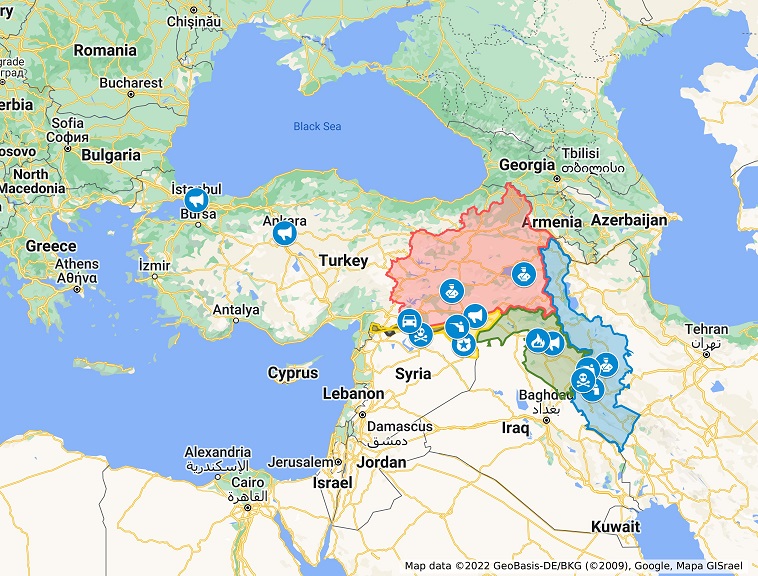1.7K
Iraq
- Iran’s Islamic Revolutionary Guards Corps (IRGC) acknowledged it struck Erbil with a dozen Fateh-110 ballistic missiles on March 13. The IRGC claimed it was targeting an Israeli base in an official statement that read, “Last night, the strategic center of the Zionist conspiracy and evil was targeted by the powerful missiles of the Islamic Revolutionary Guard Corps.” However, the Kurdistan Regional Government (KRG) rejected the Iranian claims and said, “We reiterate that the propaganda of the perpetrators of this attack is far from true.”The missiles struck near the site of the new US consulate, causing damage to local media outlet Kurdistan 24’s headquarters and a businessman’s home. At the same time, the attack drew immediate outrage from the international community and Iraq’s Kurdish parties. The US State Department denounced Iran’s “outrageous violation of Iraq’s sovereignty,” while US National Security Adviser Jake Sullivan said, “We are in consultation with the Iraqi government and the government in Iraqi Kurdistan, in part to help them get the missile defense capabilities to be able to defend themselves in their cities.” On Monday, Iraqi Prime Minister Mustafa al Kadhimi and several Kurdish officials toured the site of the Iranian attack. Also, on Monday, the Iranian ambassador to Iraq, Iraj Masjedi, vowed Iran would launch more attacks on Erbil if “three other Mossad centers were not closed.” Lastly, the Council of Representatives of Iraq established an investigation committee to probe Sunday’s attack after Muqtada al Sadr, head of Iraq’s largest parliamentary coalition, spoke with Kurdistan Democratic Party (KDP) head Massoud Barzani via phone.
Iran
- The Cooperation Center for Iranian Kurdistan’s Political Parties (CCIKP) denounced the IRGC’s missile attack on Erbil and called for the international community to “stop the Islamic Republic.” “For many years, the Islamic Republic of Iran ignored the international laws and norms, not only by breaching the sovereignty of Iraq but by meddling in its affairs and creating crises and issues for the country,” read the CCIKP statement. In 2018, the IRGC launched a ballistic missile strike on the exiled CCIKP’s headquarters in Iraqi Kurdistan, killing 16 and wounding dozens.
- 11 Kurdish border porters (kolbars) were injured in two separate car accidents in Rawansour and Paveh (Pawa). Further, Iranian border guards wounded at least five kolbars in ambushes near Kangavar, Nowsud, and Sardasht. Three more kolbars were injured when they fell from cliffs near Nowsud and Salas-e Babajani. Lastly, the Hengaw Organization for Human Rights reported IRGC personnel killed a 70-year-old woman, Sorat Siadi, and her 30-year-old son, Pouria Razee, in their vehicle near Dalahu on Sunday.
- Iranian authorities warned activists, community leaders, and teachers across Iran’s Kurdish region to refrain from participating in celebrations other than those “organized by the state” during Newroz. Dozens of Kurds were arrested in 2021 for celebrating Newroz by singing Kurdish songs and displaying the Kurdish flag. Separately, Urmia’s Islamic Revolutionary Court sentenced a Kurdish political prisoner named Fairouz Mosalaou to death for “waging war on the state” and “membership of a Kurdish party.”
Syria
- Turkish and Russian forces conducted their 92nd joint military patrol near the Kurdish town of Kobani. That said, while joint Russian-Turkish patrols are intended to enforce a 2019 Russian-brokered ceasefire between Turkey and the Syrian Democratic Forces (SDF), they have failed to prevent Turkey and its Syrian proxies from launching hundreds of attacks on SDF-controlled territories, including several that wounded at least three children near Ain Essa last week. Concurrently, the Syrian Observatory for Human Rights (SOHR) reported the SDF exchanged fire with Turkish proxies northwest of Hasakah. On a separate note, the SDF conducted a security operation targeting ISIS (Da’esh) cells in al Shadadi. Moreover, Russia continued to support the Assad regime’s efforts to reestablish control over the Badia by bombing several Da’esh positions in the area.
- On the 11th anniversary of the Syrian uprising, the Syrian Democratic Council (SDC) released a statement blaming the Assad regime for creating a “humanitarian catastrophe” and the “killings, displacement, and destruction” that have engulfed the country since March 15, 2011. The SDC statement also accused the Assad regime of “rejecting all internal dialogue initiatives seeking a solution” and “allowing Syria to become a hostage in the hands of regional and international powers.” The SDC then called for all opposition parties to forge a “unified vision” and chart a “road map” for ending the ongoing crisis and “occupations.”
Turkey
- The Pro-Kurdish Peoples’ Democratic Party (HDP) refuted the immunity lift on its Kurdish lawmaker of Semra Güzel, calling the process by the Turkish parliament “ the latest attack on parliamentary democracy in Turkey.” The Turkish ruling parties, led by Justice and Development (AKP), removed Güzel’s immunity as the government launched criminal investigations against her for photos dated back in 2014, showing the lawmaker with her fiance, a member of the Kurdistan Workers’ Party (PKK) in Iraqi Kurdistan. However, the HDP said that many of its “leaders, including the party’s co-chairs, visited PKK” during the peace process after a “formal request of the Turkish government as part of peace negotiations” between 2013-2015. Since 2016, thirteen HDP deputies have been removed from the parliament by the government.
- The Turkish police arrested three Kurds, HDP’s Youth Council leaders, in Van. Separately, a second appellate court in Diyarbakir (Amed) ruled in favor of the police’s fatal shooting of a young Kurd in 2017 during the Newroz Celebration. Previously, an appeal court in Amed ruled for compensation by the police department of the family of the victim, Kemal Kurkut.
- The Kurdish parties, mainly the HDP, announced their plans to celebrate Newroz across the country under a new slogan, “It’s the era of victory.” Despite the government’s restrictions, millions of Kurds celebrate Newroz in the Kurdish Region of Turkey, as it symbolizes freedom and rebellion against tyranny.

